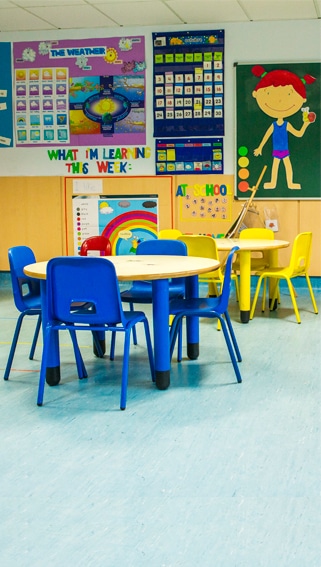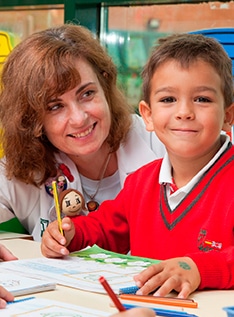
Bilingual program

Bilingual program
At LOGOS NURSERY SCHOOL complete immersion of English from the age of 3 is established throughout the whole day. Immersion where pupils are in continuous contact with the English language, be it in the classroom, playground or dining room, making the pupil's communication progress a natural and satisfying process.
Together with this, and taking into account the global objective for our pupils in reaching the level considered BILINGUAL, (high knowledge of two languages and its use indistinct and frequent), while our socio-cultural environment is monolingual, we realize the necessity to increase periods of English through means of communication, especially at this first stage of contact with the language.
ADVANTAGES OF BILINGUALISM
ATTENTION IMPROVEMENT
Bilingual studies improve attention capabilities and memory-training
COMMUNICATION
As a new means of communication, without borders with the world
APPROACH BETWEEN CULTURES
Cultures are drawn together breaking stereotypes and expanding new horizons
TOLERANCE
Pupils perceive reality in a more critical way and from a plural perspective
BILINGUAL
PROGRAMME
The whole project is based on daily practice and experimentation, through games and ludic activities carried out in the English language, as it is at this stage where children become more efficient in the production of new learnings.
Along with the teaching through linguistic immersion in English, the area of student development is integral, seeking a balanced and harmonious development in all dimensions: intellectual, human, social and professional.
All this under the umbrella of values as rules of conduct and attitude, where behavior and agreement with what we consider correct; values such as respect, friendship, understanding, tolerance, patience, solidarity must be learnt, appreciated and accepted.
In this way, during these early stages, the English language becomes a means of natural oral communication, based on listening and speaking skills, which will significantly advance the introduction of the written language at a later stage.
Learn while playing
Based on original stories and songs, our method combines global comprehension, communication, reading- comprehension, written expression and active participation. Through playful, multisensory and structured activities, a spiral learning is encouraged, allowing the teacher to go back at any time to strengthen knowledge before advancing and applying new concepts.
METHODOLOGY
Within a full immersion environment in English, from the age of 2 we work with a phonetic method developing clear and clean recognition in the process of verbal communication. This leads to spontaneous reading and writing of 5 and 6 year olds, in this way avoiding memorization as the only recognition of words.
"At Logos Nursery School we grow up speaking English".
The path taken follows through oral comprehension leading to the understanding of the written word and so, step by step, conducting pupils towards reading comprehension, converting scrawl into letters, letters into sounds, sounds into words, words into stories and stories into books. The spoken word is segmented into easily identifiable sounds, these sounds, in turn, are represented graphically in a letter or combinations of two or more letters (digraphs and trigraphs) on the course to internalize each corresponding sound in its grapheme and so, in this way decode words and later read autonomously.
In English, to present sounds there are only 26 letters and so the same sound can be written in different graphic representations but, really 44 different graphemes are learnt. Pupils access reading as a mechanical skill, relating sounds to graphemes, and as a comprehensive process by associating meanings to a word or a sentence. Gradually the amount of words expands into phrases and even longer texts that children can read, understand and pronounce when asking them to read vocabulary that they have previously found in a meaningful context: story, song activities...
Through this we achieve at the same time as we develop phonological awareness, the initiation in oral comprehension and auditory discrimination. In this alphabetical code there are series of many common words, that not being written as they sound, do not follow the code at all. We call them TRICKY WORDS. At the same time, as pupils internalize the grapheme (sound correspondence) they practice the technique of linking the sounds (BLENDING) as they listen, identify and count the sounds of the words (SEGMENTING). It is then we incorporate the (TRICKY WORDS) to form simple sentences until the child is able to read a short text.
TRICKY WORDS BLENDING
SEGMENTING SPEAKING
LISTENING EDUCATION

For reading to be comprehensive, the first norm is that the child only reads words that he/she has previously heard and is able to understand in a meaningful context. We always start with the presentation of a graphic representation of each sound (simple code), to finish presenting the most common and relevant orthographic alternatives of the sounds (complex code). The remaining orthographic alternatives needed later on for a deeper, more profound reading we call "advanced code" are not presented at this stage.
In this phonetic method, children read the words as they go through a process of self-correction, since reading always happens after having worked previously the words orally. This allows children to relate to what they read with what they know and permits them to speak and pronounce correctly.

TEACHERS
Teachers are the outstanding feature of this innovative project, the motor that pushes us to our goals who, without a doubt, possess the greatest potential. They are at all times a positive model for each and every one of their pupils. Specialized teams that work with different age groups, all with extensive experience and whose vocation and dedication to their pupils is worthy of highlighting.
Human resources are undoubtedly the greatest potential of Logos International.
Working closely beside the native teachers, as well as tutors and assistants responsible for the classroom, are other specialists who carry out complementary activities included in the curriculum: Psychomotor, Music, Computer and Swimming that complete and consolidate the globalized bilingual project.




